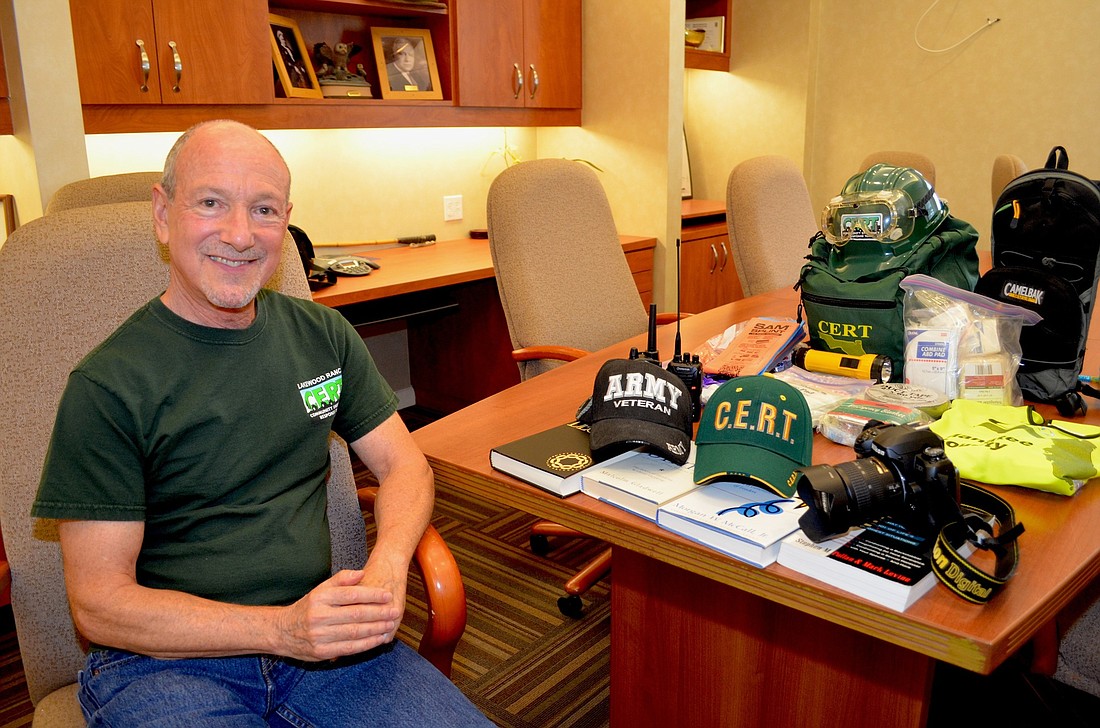- December 30, 2024
-
-
Loading

Loading

A former U.S. Army medic during the Vietnam War, Victor Kline needed his mind to move as quickly as his body when injured soldiers came into Irwin Army Hospital in Kansas.
The 71-year-old worked in the Midwest hospital for the duration of his four-and-a-half-year tour in the military, during which he assisted surgeons with removing limbs, treating burn victims and other injuries service men and women acquired during battle. Forty-eight years after he took on the role of lifesaver, Kline still helps others during disastrous times, but on a different scale.
The Greenbrook resident is president of the Lakewood Ranch-based Community Emergency Response Team (C.E.R.T.), which trains local residents on best practices for securing neighborhoods and ensuring residents' health and safety during natural disasters, such as hurricanes. C.E.R.T. will host another free (for Ranch residents) four-session course on disaster preparedness Oct. 15, at Lakewood Ranch Town Hall.
As East County enters the third week of hurricane reason, Kline stresses the importance of being prepared for "just-in- case scenarios," that could rip through communities this summer.
Because there hasn't been a serious hurricane in the area in 10 years, there's complacency or the thought that, "This won't happen to me. Tt won't happen here." Hurricane Charlie was one of the strongest storms to tear through Florida, and that was in 2004. You could say that we're due. That storm was predicted to hit Tampa, so people in Charlotte County didn't prepare, and you saw what happened.
There are three deadly misconceptions about hurricane threats: There will be time to prepare; I can always evacuate; and we'll just shelter at home. A storm's path may change at any time, and if you wait too long, there won't be anywhere to go. For those of us in East County, we have State Road 70 and Interstate 75 — those roads will be bumper-to-bumper. Imagine yourself stranded on I-75, low on fuel, stopped in traffic and a storm is coming.
Everyone should have a family disaster plan. And, the first question you should ask is, 'Will we stay or evacuate?" All other decisions stem from the answer to that question.
Being a C.E.R.T. volunteer means knowing how to help your neighbors and your community. We're not curing diseases or performing surgery. I teach the life-saving skills necessary to keep a neighborhood afloat until the real help — the first responders — arrive to the scene.
The biggest concern for people who just start the C.E.R.T. program is, 'What if I do something wrong?' That fear even trumps the New Yorker mentality of, 'I don't want to get involved.' But, being a bystander is much more difficult, than being someone who helps keep a community together. C.E.R.T. members learn to rely on muscle memory. So, rather than stressing about how an injured person is feeling, or other environmental factors, we're already taking the motions to help resolve the situation, or at least make it more bearable.
We rely on neighbors helping neighbors. You don't need to be a doctor or have military experience to get involved. I think that's a common misconception that prevents people from getting involved.
My understanding of emergency medicine is much more advanced now than it was when I was that 22-year-old kid standing in an emergency room in front of an injured soldier. C.E.R.T. starts with the basic and most important aspects of treating someone who is suffering from a mental side effect of a disaster, such as shock, or someone who has a broken arm. I teach basic live-saving skills.
My objective when I worked in that Kansas hospital was to help save lives, and that's similar to what I'm training others to do now, but in Lakewood Ranch. When you join the military, you train for an event you hope, in the back of your mind, will never occur. Hurricane preparedness is based on the same idea.
Very few people — unless you're a survivalist, love to camp or are prepping for a zombie apocalypse — take preparing for natural disasters as seriously as they should, especially out here (in Lakewood Ranch), because we're not technically in a flood zone. People think, 'No hurricane, no problem.' But, in reality, one hurricane can cause a big problem. Decide what you're going to do just in case — if not for you, than for your family.